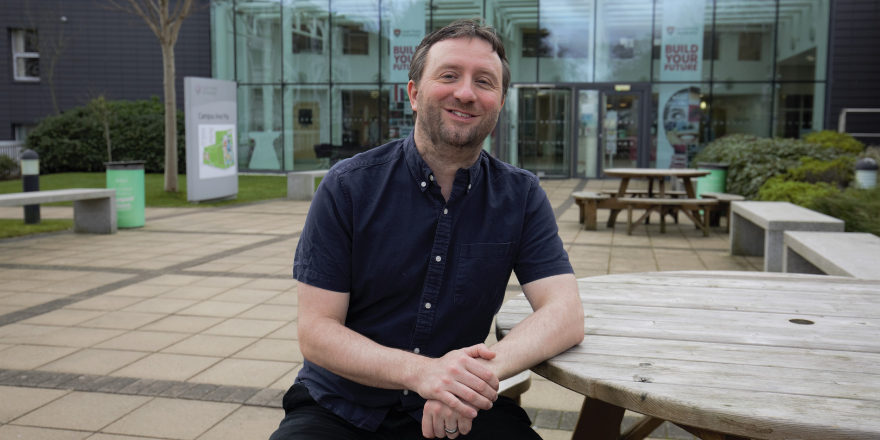Research led by Dr James Jackson at Leeds Trinity University into the hearing condition tinnitus is helping to educate healthcare professionals and patients about how to better understand and live with the condition.

Dr Jackson, Reader in Psychology at Leeds Trinity, himself deaf and a tinnitus sufferer, first published research in this area in 2014 when his paper cognitive performance decrements in non-help-seeking tinnitus sufferers put forward a theory suggesting that distress caused by the condition can have a negative effect on people’s ability to focus and complete tasks.
In 2019, his ground-breaking research paper The Cortisol Awakening Response: […] an Effective Objective Measure of Tinnitus Distress evidenced that tinnitus distress has significant effects on hormonal rhythms, resulting in vulnerability to clinical depression and reduced ability to cope with significant personal challenges.
Dr Jackson defines tinnitus as a chronic medical condition characterised by perception of noise in the absence of corresponding external stimuli, often but not exclusively in the form of constant ringing or high-pitched whistle sounds which can result in distress, concentration difficulties, clinical depression, anxiety, and insomnia.
Approximately 10-12% of the general population having persistent tinnitus and 1-2% suffering significant reduction in life quality. Unusually for such a widespread aliment, tinnitus has no cure and few clinically adequate treatment options.
Dr Jackson’s research has influenced and informed audiologists, ENT surgeons, professionals from the hearing aid industry, app developers, charities such as the British Tinnitus Association and professional bodies including the British Society of Hearing Aid Audiologists.
As part of this, his peer-reviewed research has been published in international journals, helping healthcare professionals around the globe to improve the way they interact with tinnitus patients.
It has also enabled patients to better understand the condition and how a proactive mindset and improved sense of control can empower them seek viable interventions for managing the symptoms.
Dr James Jackson said: “As a psychologist, a deaf person and someone who suffers from tinnitus, this research holds added significance and is an area of keen interest for me.
“I am extremely proud to have reached an international audience with the research and it is rewarding to know it is helping patients and professionals to better understand and manage the condition. There is still much more work to be done, and I look forward to developing my research further and hopefully helping more people in the future.”
David Stockdale, Chief Executive of the British Tinnitus Association, speaking about Dr Jackson’s 2019 paper said: “It is pleasing to see this paper published in the American Journal of Audiology, and that the metrics have suggested worldwide recognition of what is a novel piece of research.
“In the absence of a cure for tinnitus, it is important to be able to measure tinnitus distress so as to more effectively investigate the efficacy of tinnitus interventions. As such, this work has international significance, and we would hope Dr Jackson continues with this approach.”
Matthew White, Senior Audiologist for The Rotherham NHS Foundation Trust with whom Dr Jackson has delivered patient workshops said: “The feedback from patients is always very positive regarding Dr Jackson’s session and multiple patients have commented to me that their viewpoint on how they perceive their tinnitus has been changed for the better following the talk. Indeed, the content of his research has enabled clearer explanations of tinnitus that I make reference to in clinic on a regular basis. Dr Jackson’s explanations of the effects of tinnitus and the sorts of thing required for successful intervention, as well as his annual talks have been of great value.”
Dr James Jackson is a Chartered Psychologist and Associate Fellow of the British Psychological Society.
Leeds Trinity’s ‘Cognitive Inefficiency in Tinnitus Patients’ and ‘The Cortisol Awakening Response in Tinnitus Patients’ research was included as part of the University’s submission to the Research Excellence Framework (REF) 2021.
Read more about Leeds Trinity University and REF 2021.